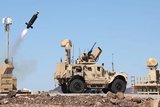Saab radars gaining low, slow target detection
As the number of airspace incursions involving UAVs continues to rise and make headlines due to the risk that they pose, industry is stepping up its response to this problem, including Saab which has been pushing the benefits of adding a low, slow target detection capability to its established family of ground- and sea-based air surveillance radars.
Events at Gatwick and Heathrow airports in December 2018 highlighted the lack of readiness of those in charge of critical infrastructure such as this, as well as a shortfall in powers that authorities have in enforcing countermeasures, so industry has been quick to
Already have an account? Log in
Want to keep reading this article?
More from Defence Notes
-
![France unveils new strategic review as Macron vows to accelerate defence spend]()
France unveils new strategic review as Macron vows to accelerate defence spend
The 2025 National Strategic Review highlights the importance of readiness against a growing Russian threat and was published days after a speech from the French President Macron who called for an increase in defence spending worth €6.5 billion by 2027.
-
![Europe turns to industrial and procurement co-operation with Ukraine as supplies continue]()
Europe turns to industrial and procurement co-operation with Ukraine as supplies continue
Equipment has continued to flow into Ukraine from the European Union (EU), NATO and western countries as the war against Russia continues but other types of support with longer-term prospects are appearing.
-
![UK releases security strategy and plans for future defence spending boost]()
UK releases security strategy and plans for future defence spending boost
The UK’s National Security Strategy brings together the recently released Strategic Defence Review (SDR), Strategic Security Review, AUKUS Review and Industrial and Trade Strategies. At the same time, the UK made a commitment to reach defence spending of 5% of GDP by 2035 and Germany committed to 3.5% by 2029.
-
![Pentagon’s FY26 defence budget proposal is $130 billion more than US Congress plans to provide]()
Pentagon’s FY26 defence budget proposal is $130 billion more than US Congress plans to provide
The House Committee on Appropriations approved a FY2026 bill reducing investments in main defence programmes.
-
![What role could holographic and 3D capabilities play in the warfare of tomorrow]()
What role could holographic and 3D capabilities play in the warfare of tomorrow
Holographic and 3D technologies have been lauded by some for their ability to provide technical and operational advantages for military training and planning. But is the hype truly justified?
-
![Unfolding the Golden Dome for America: Seven things you should know about the programme]()
Unfolding the Golden Dome for America: Seven things you should know about the programme
Shephard talked to multiple experts about the most pressing concerns and considerations regarding the air defence system advocated by President Trump.

























